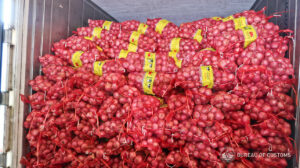
Regulator probing possible smuggling in onions being sold online
THE Bureau of Plant Industry (BPI) said it is looking into the possibility that the onions currently being sold online were smuggled into the country.
Noting that import permits issued to legitimate traders have been fully taken up, it said the onions sold online are less likely to have come in through regular channels.
“We are coordinating with the law enforcement agencies to verify… we will have to check,” BPI Director Gerald Glenn F. Panganiban said in a briefing.
Mr. Panganiban noted that the Philippine National Police will release a memorandum instructing its regional offices to support the BPI in investigating the sources of the onions being sold online.
He said shipments that bypass the regular Sanitary and Phytosanitary Import Clearance (SPSIC) permit and inspection process pose possible health risks.
“The alleged smuggled goods carry the risk of pests or diseases; that is why we should not patronize these products if we do not know (their) source,” Mr. Panganiban added.
“The issued SPSICs (for onions) from last year are fully utilized, and we are no longer issuing new clearances,” Mr. Panganiban said.
Agri Party-list Representative Wilbert T. Lee has said that farmers are losing between P10,000 and P15,000 per hectare a month due to competition from smuggled onions.
He added that onions sold online are currently being offered at P15 to P20 per kilogram.
Domestically grown red onions sell as retail for between P60 and P120 per kilo, while imported red onions fetch P90 to P100, according to Department of Agriculture (DA) price monitors as of Feb. 26.
Domestically grown white onions are selling for P60 to P90 per kilo, while imported varieties are offered at P80 to P120.
In late December, the DA said it plans to allow imports of 17,000 metric tons (MT) of red onion and 4,000 MT of yellow onion from China, India, and the Netherlands. — Adrian H. Halili



